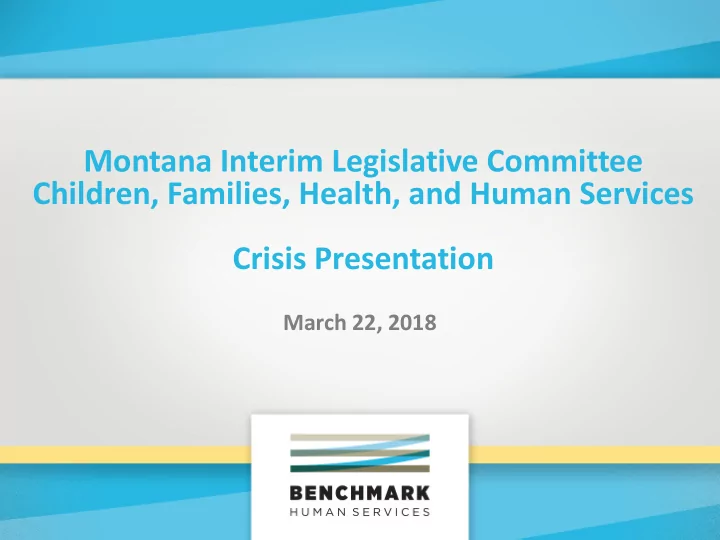

Montana Interim Legislative Committee Children, Families, Health, and Human Services Crisis Presentation March 22, 2018
What is a Crisis in IDD Services? • A behavioral or psychiatric emergency in a community setting • Dangerous or could quickly become dangerous, including possibility of serious harm to self or others • Could jeopardize community residential placement or ability to continue living with family/could lead to institutional placement (if an option) • May result in arrest or hospitalization
Role of IDD Mobile Crisis Services • Quickly responds to a behavioral or psychiatric emergency in the community • Reduces danger through on-site interventions that also prevent future escalations • Preserves residential placement/prevents institutionalization—builds provider capacity • Prevents arrest/incarceration/homelessness or hospitalization • Reduces cost—IDD system, law enforcement, local hospitals/emergency departments • Allows sustained community integration of the full IDD service population; mitigates significant impact of the 20% factor of individuals with intensive needs
Components of IDD Crisis Systems • 24/7 hotline—single point of entry (SPOE) • On-demand mobile crisis teams for on-site intervention, stabilization, and in-home support • In-home services for families/residential providers • Out-of-home placement (crisis respite homes) • Telemedicine coverage for psychiatric support • Out-of-home psychiatric stabilization; typically 7 days or less • Reduction of risk/stabilization—build capacity in the individual’s and community-wide support systems • Prevention strategy to anticipate/eliminate re- occurrence: intensive case management and provider training • Transportation
Typical Personnel in Crisis Systems • Psychologist/Director of Program • Consulting Psychiatrist • Behavior Clinicians or Board Certified Behavior Analysts (BCBAs) • Licensed clinicians such as LCSWs • Nursing consultation • Direct support personnel (crisis calls/in- home/crisis respite homes) • Collaboration with area law enforcement, jails, homeless centers, hospitals, MH facilities
Common Barriers/Solutions • Limited funding due to Medicaid fee for service reimbursement not sufficient/unpredictable demand to cover costs—strategic allocation of state funds • Limited provider capacity to support high need populations (increases crises)—provider training/support and no-reject approach • Crisis respite homes expensive/fill up—build provider and crisis capacity • Lack of crisis stabilization—MH coordination/purchase bed days • Seen as only an IDD vs. a community issue—system analysis and state/local collaboration
Georgia IDD Crisis Services
Scope of Crisis System in Georgia • All 159 counties have 24/7/365 mobile crisis response for IDD and Behavioral Health (BH) • Benchmark serves 86 counties for IDD and 119 for BH crisis • Accessed through statewide crisis line • Currently, separate teams respond to IDD and BH calls • BH crisis is open to anyone in the state experiencing crisis • IDD teams serve individuals in crisis who have IDD diagnosis or dual diagnosis of IDD and BH • Georgia DBHDD considering blending BH & IDD response teams to enhance and expedite services for dually diagnosed individuals
Components of MCRS in GA Face-to-face Evaluation • Available anywhere in the community, i.e.: – Homes – Schools – Jails – Street – EDs/Acute care hospitals • Rapid on-site response – Less than 90 minutes average required for IDD dispatches • Team structures for crisis response dispatches: – Teams are led by licensed clinician (SW, professional counselor) – BCBA – Direct Support Professional • Focus on least restrictive disposition, including safety planning – But able to complete involuntary evaluation orders when necessary
Components of MCRS in GA In-Home Supports • In-Home Supports – Review of existing positive behavior support plan or development of behavior protocols led by BCBA – Training for family/caregivers – Modeling of effective behavior interventions – Crisis team DSP staffed in-home to assist with implementing plan over days or weeks – Reduces need for out-of-home placement – Can provide transition support for individuals returning from crisis homes
Components of MCRS in GA Crisis Respite Homes • Community based option to avoid unnecessary hospitalization or loss of placement • Multiple homes, regionally located • Accept admissions on a 24 hour basis • Short term, up to 30 day length of stay (LOS) • Integrated teams include: – Psychiatrist – LCSW – BCBA – RN – LPN – DSP • Focus on behavior support and discharge planning beginning at admission
IDD MCRS Data Presenting Problem(s) of Crisis Calls 250 200 150 2012 2013 100 2014 2015 2016 50 2017 0
MCRS Disposition & Outcome Data Crisis Service Provision 120% 100% 17% 10% 11% 12% 12% 6% 6% 11% INPatient Hosp Stabilization 3% 80% 17% 16% 12% 20% 22% Crisis Home Stabilization 60% 26% IN-Home Stabilization 40% 68% 66% 62% 57% 46% MC Stabilization 20% 0% 2013 2014 2015 2016 2017 Potential Consequences of No Mobile Crisis Response System 60% 50% 40% 30% 50% 45% 43% 20% 30% 10% 18% 0% Law Enforcement Emergency Inpatient Loss of placement Jail involved Dept/BHCC Access Hospitalization
THANK YOU
Recommend
More recommend